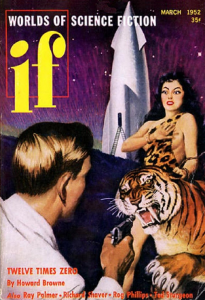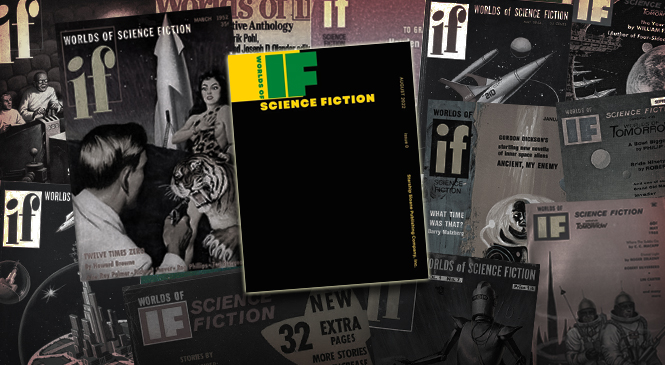A New Journey to WORLDS OF IF

[interview video follows the article]
Justin T. O’Conor Sloane and Jean-Paul L. Garnier are on a mission. They’re drawing on their experience in science fiction publishing and fandom to revive Worlds of IF magazine. Together with Dr. Daniel Pomarède as science editor and Robert Silverberg as contributing editor, Sloane and Garnier are relaunching the classic magazine in February 2024.
Sloane, who runs the Starship Sloane Publishing Company, is the great-great-grandson of T. O’Conor Sloane, who edited the first science fiction magazine, Amazing Stories, from 1929 to 1938. And with Amazing Stories in the hands of Lloyd Penney, who has plans of his own for that title, Sloane took the family legacy and applied it to another book worthy of revival. As editor-in-chief and publisher, he’ll lead the team in building on the history of the periodical.
Starship Sloane Publishing Company, Inc. is happy to announce that the 3x Hugo Award-winning Worlds of IF magazine has been revived!
Much, much more to come — stay tuned! Follow developments on Twitter @WorldsofIF.#scifi #sciencefiction https://t.co/YnztKvwIga— Starship Sloane Publishing Company, Inc. (@StarshipSloane) August 25, 2022
With time spent editing the science fiction poetry journal Star*Line as well as the amateur ‘zine Aphelion, Garnier will serve as IF‘s deputy editor-in-chief. “There’s a very long history of science fiction in the Sloane family. And of course, Amazing is already taken. Lloyd’s doing wonderful work over there. But Worlds of IF was one of the few magazines that didn’t have a revival. There was one issue, a revival in the eighties, but it only lasted for one issue.”
 Originally published by Quinn Publications, IF published a number of award-winning stories over the course of its run, including The Moon is a Harsh Mistress by Robert A. Heinlein and “I Have No Mouth and I Must Scream” by Harlan Ellison. Launched during the second wave of science fiction magazines to come after World War II, IF debuted in March 1952 under editor Paul Fairman, who was let go after three issues due to poor sales. Over the course of the magazine’s run, editors would come and go, sales would improve and decline, and eventually Quinn sold the publication to Galaxy Publishing.
Originally published by Quinn Publications, IF published a number of award-winning stories over the course of its run, including The Moon is a Harsh Mistress by Robert A. Heinlein and “I Have No Mouth and I Must Scream” by Harlan Ellison. Launched during the second wave of science fiction magazines to come after World War II, IF debuted in March 1952 under editor Paul Fairman, who was let go after three issues due to poor sales. Over the course of the magazine’s run, editors would come and go, sales would improve and decline, and eventually Quinn sold the publication to Galaxy Publishing.
Garnier says, “Worlds of IF was always sort of the younger sibling of Galaxy. And Galaxy, of course, was an amazing magazine. But Worlds of IF was a place where editors were inclined to take chances. They had lower pay rates, but they had a reputation for debuting authors, which was really cool, and that’s something that we want to do. It’s very important to us, particularly to me, to have a multi-generational magazine. I want to debut new authors, but also bringing back tried and true authors that we love and have been reading for a long time.”
IF enjoyed the reputation for experimenting a little more than Galaxy had, and so it was the place for the stories that didn’t quite fit the typical definition of science fiction, something that Garnier plans to continue. “I’m kind of with Damon Knight’s definition of science fiction — who, incidentally, was an editor of IF for a while — science fiction is what we point to when we say science fiction. So I don’t find it to be my job to define what science fiction is. But I’m a huge fan of genre fiction, obviously, so we’re definitely going to be having science fiction as our primary focus. We’ll probably have a little bit of science fantasy, occasionally fantasy. Horror, I don’t think we’ve really made a decision yet. But it’s going to be predominantly science fiction. We want to keep with the heritage of the magazine.” The heritage of the magazine, like with other print publications, also includes a demise from a drop in sales. In 1974, the book was folded into the pages of Galaxy, even though it was the better circulating title of the two. The final issue was dated December 1974.
And in the age of the internet, one would think that a print publication would be somewhat anachronistic, but then we must consider that the younger generations are discovering now just how fragile digital media can be, how vulnerable it can be to deletion or revision without warning — see PlayStation’s recent announcement that all Discovery content will be removed from customers’ libraries, even after said customers paid for the material. Garnier holds up the last copy of IF edited by Frederik Pohl. “I’ve got a huge collection of old copies of Worlds of IF here. I’ve been re-reading a lot of them, which has been super-fun, and that’s one excellent thing about print media, is that it doesn’t die on us. It can’t be altered. And as a bookstore owner, print media is particularly important to me.”
It also seems counter-intuitive to be launching a new business venture like this in today’s economy, especially in the wake of so many digital platforms going dark (Jezebel has shuttered for now, Vice and Spotify have recently announced more layoffs, just to name a couple of examples. That fact is not lost on Garnier, but he also sees opportunity. “It’s a very exciting time. It’s a little bit of a strange time to be launching a magazine. A lot of the digital magazines have folded over the last year, and unfortunately, I think we might see more of that as Amazon changes its digital distribution.”
In March, Amazon announced that they would no longer sell magazine and newspaper subscriptions through Kindle Newsstand, affecting many online publications as well as print titles. According to Neil Clarke at Clarkesworld, this will affect Clarkesworld, Forever, Asimov’s, Analog, F&SF, Lightspeed, Fantasy Magazine, Nightmare Magazine, The Dark, Apex, Galaxy’s Edge, and Uncanny among many other publications.
 Garnier recognizes the risk involved. “It’s super-important to be able to have the business structure of the magazine make sense so we’re not just one of these one-and-done things where it comes and goes. This is a long-term project for us. We want to make sure it’s successful. One major angle of that is making sure that the authors are taken care of and that this is a desirable venue to be a part of. We are definitely paying, and as this moves forward and we succeed, then we will up our rates.”
Garnier recognizes the risk involved. “It’s super-important to be able to have the business structure of the magazine make sense so we’re not just one of these one-and-done things where it comes and goes. This is a long-term project for us. We want to make sure it’s successful. One major angle of that is making sure that the authors are taken care of and that this is a desirable venue to be a part of. We are definitely paying, and as this moves forward and we succeed, then we will up our rates.”
Those rates will be lower than Garnier would like them to be, but the new venture is starting small with an eye toward growth. “Unfortunately, the publishing industry’s never quite been able to keep up with the economy in that way, notoriously poorly paid. That being said, SFWA’s eight-cents-a-word is the standard for pro magazines. We’re starting as a semi-pro, so we’re paying three cents a word initially. That’s something I’d like to bump up on a regular basis till we get to pro rates as we work out our advertising schedule and find out how to make the magazine lucrative. It’s imperative to me that authors are taken care of and be paid for their work. We’re paying fifteen dollars per poem, three cents a word for fiction, so hopefully within the first year we can bump that up to four or five cents a word. It really depends on what we can pull off financially and what the project can bring in.”
Sloane and Garnier are also rolling out the book on a modest schedule as well: for the first year, perhaps two, IF will publish three issues per year. Nothing too ambitious, both in terms of resources or time commitments, given everything else the two have going. Eventually, they’d like to see the book run monthly, but that’s a ways off. “At the moment, Justin is running a lot of online magazines. I’m the editor of the Science Fiction and Fantasy Poetry Association’s journal Star*Line, plus the editor of all the various projects I do through Space Cowboy, my bookstore. So, we have our hands quite full with other things as well, and once my term at Star*Line is up, which will be, I think two years from now, then we plan on ramping things up with IF significantly. That being said, while we’re doing three print issues a year, for starters, we’re also rolling out a ton of different bonus free stuff on our web site. There’s going to be a Worlds of IF podcast, which has — we’re doing classic stories from the original run of IF, and on top of that, we’re doing interviews with different people in the science fiction field, articles mostly pertaining to the history of IF at this point. So there’ll be a ton of supplementary material coming in the meantime.”
That supplemental material will include articles looking into the history of Worlds of IF, features on fandom, and explorations of the various science fiction collections located around the world. “We did an interview with Gideon Marcus of Galactic Journey, who does incredible fan work. We just published an interview with Jeremy Brett, who’s the curator of the Cushing science fiction archive at Texas A&M. We’re still figuring out how to do this, but we’ll probably be doing a like a one-page fan profile in the magazine just to venerate our fans and all the amazing work they’re doing, because so much of the neat things that happen in science fiction are not from the big publishers. They’re from APAs and people trading fanzines, and this is a world I’m very active in, and I think it’s important for the publications to do that, too. And like I said, it’s just something I’m not seeing quite as much of lately, and I think it’s a mistake to forget the fans. Science fiction is a world of fandom. There’s so many people that are deeply involved and care and love this. And I don’t think the field could exist in a healthy way without that fandom, so that’s something I’m not going to forget.”
The podcast, which will also be available on IF‘s YouTube channel, will include audio adaptations of short stories from past issues set to music. Garnier says, “There were a lot of wonderful stories that were first printed in Worlds of IF. It’s an amazing treasure trove. At the moment, that’s a rights issue, for the most part. We do plan on reprinting some older material. With the audio adaptations, we’re using stories that are in the public domain so we don’t have to deal with the estates just yet. But moving forward, we’re definitely going to be doing some of that, and for our first issue we have a story from Robert Silverberg that, if I’m remembering correctly, originally appeared in IF. So, we’ll definitely be bringing some back. We want some of the old and the new. We’ll be keeping in tradition of what the magazine had done, but also bringing more things in. We’re going to have more science fiction poetry, which is something that you didn’t see in IF quite as much back in the day. And we’d like to do fan profiles and fan letters, because that’s something that a lot of the magazines aren’t doing as much of these days.”

Silverberg’s addition to the editorial staff will bring his wealth of experience and input to the operation. Along with his story in the first issue, there will be a “pretty long story” by David Brin. Garnier says, “There’s some really exciting things in the works here for the relaunch of Worlds of IF. We’ve got our first issue already together. They’re about to go to the designer. That’ll be coming out in February. But for the debut issue, we’ll also be doing a free digital download of the magazine. There will be a paywall of the magazine moving forward after that, but we’re going to have the first issue, a complimentary digital version, but also in print, because that’s very important to us to keep print alive. And really, it never went away. A lot of us still prefer to read print, physical media, and to have it on our shelves afterwards.”
The adjustment to print isn’t that much of a stretch for either Sloane or Garnier: “I’ve been working in print through Space Cowboy Books for a few years now, so that hasn’t been a great adjustment. And Star*Line is a print magazine as well as digital, so that experience in print publishing has been very helpful, as far as figuring out how the formatting works, what kind of team we need to get this thing done. I’ve done a handful of anthologies and single author collections, so I’m not new to that angle of the business, which has been very helpful as far as figuring out timelines and making sure that we can pull this thing off on the schedule that we’ve announced. And through both the print material and the digital magazines that we’ve both worked for, we’re bringing a breadth of experience from different angles, and also a lot of relationships with writers. So that’s been kind of easy to select who we want to be in the first couple of issues. We’ll eventually open to submissions. At first, we’re doing invite-only just to make the work load manageable and to not get mired down in the slush, but make sure that we’re producing a real quality magazine with really good stories.”
Sloane and Garnier definitely plan to include debut authors, just as the original Worlds of IF did. There’s even the possibility of reviving the writer competitions at some point in the future, perhaps even a “Sci-Fi-Ku” (short form science fiction haiku) contest. In the meantime, they’re working to make sure all the mechanics are in place for the magazine to have a successful run that lasts for more than one issue (see the previous revival attempt back in 1986). Garnier also plans to include experimental forms of science fiction, such as flash fiction and poetry. “Justin Sloane and I have very different approaches. He’s more of a traditionalist. I’m more into experimentation. So I think we’re finding a really nice balance in the type of material that we’re bringing in. It’s going to be the type of magazine that has a little bit of something for everybody. We’ll push the envelope a lot, but also more traditional forms of storytelling that we all enjoy and love. I think it’s going to be a very fun mix of things. There’s no thematic focal point, necessarily, just great stories. But we’re very open to new forms in how stories are told.”
They’re also open to feedback from fans, something that Garnier notes has been absent or low-priority for a number of online publications of late. “Interacting with fandom, I find, is going to be very important, and important to me as a fan. Science fiction magazines have a wonderful tradition of interacting with fans. There’s always fan columns, IF had a letters section like many of the magazines did, and this is something I don’t see a lot of in today’s magazines, and we really want to bring that back because what is science fiction without the fandom? Fandom is extremely important.” Garnier just spent the weekend at LosCon, meeting fans and passing out handbills to promote the new magazine. He’s also been sending out press releases as well as writing for his fanzine along with ‘zines published by the National Fantasy Fan Federation (N3F is where we contribute to the FanActivity Gazette). “Personally, I want to know what the fans think of the stories so that we can make it a better magazine for them. But also, I love the back and forth, you know? Why did you like this story? Why didn’t you like this story? Keeping it friendly, hopefully, but to me that’s a very important thing, and I think it’s exciting for the writers, too, to be able to get to hear what sort of response the audience has to their stories.”
Garnier thinks it’s very important to have personal interactions with fandom, not just rely on time spent online. “I think there’s a misconception that everyone’s on the internet. It’s not true. Especially those of us that are obsessed with print media often try to avoid being online if possible. A lot of my work happens online, so I like my personal life to take place in meat space. So, we’re doing a variety of angles in that.” He’d even like to visit specialty science fiction bookstores around the world and promote Worlds of IF there in the shops.
“This is exciting for me as a bookstore owner — there are not many, but around the world there’s a handful of science fiction specialty bookstores, and I’m going to be bringing in both for the magazine and for the web site some interviews with some of these booksellers that run these amazing bookshops that focus on science fiction. Partly as being a fan, but partly to want to make a well-rounded magazine, I’m very keen to interact with the different aspects of science fiction fandom, whether that’s coming from an academic sense or just speaking with fans directly. There’s the Liverpool collection, too, and the Merril up in Canada. These are all places I’d like to talk to and I have interacted with in the past, not just for their fanzine archives but the memorabilia, incredible book collections. I’ve been fortunate enough to go visit the Eaton a few times and do some research there. That place is incredible. I could spend months in there.”
That legacy carries over into the weight of the responsibility Garnier and Sloane feel when taking on the task of reviving a classic science fiction magazine that claims in their editorial roll call Damon Knight, Jim Baen, and Frederik Pohl. “We’re both very aware that we are stepping into some big shoes to fill. Which sort of puts the pressure on, to be stepping in the shoes of some of my heroes and people whose work I’ve loved as editors and authors. So that’s quite fun.”
The first issue of the new Worlds of IF will be available in February 2024.
![]()



